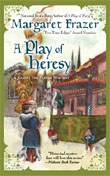CHAPTER 10
With both of them mutually silenced for the moment by those thoughts, Joliffe took his empty cup and Sebastian’s and went to have them refilled. Sitting down again and handing Sebastian his, he said, “It would be good to know if the murderer encountered Kydwa by chance or on purpose, planned ahead to kill him or simply used the moment as it came. And what happened to the horses Kydwa and his man were riding?”
Here and in the previous chapter, Joliffe is in the first stages of gathering sufficient information to catch a murderer. But could he, would he – as a medieval man — actually have done this? I ask because I’ve heard that someone has claimed that all history mysteries set in medieval times are simply wrong from the very outset – are not historical at all — because medieval people didn’t do that kind of thinking, that the concept of detecting anything was beyond them.
This notion has to be rooted in the enduring idea that the Middle Ages were inhabited by people who were, without exception, crude, violent, ignorant, and unremittingly filthy and disease-ridden; that medieval people could not read or wash or stop killing each other, and certainly couldn’t think much beyond the level of “Who do I hit/rape/rob/slaughter next?” or – at best – “When will the Renaissance get here so I can take a bath?”
I shall ignore all the exceedingly overt evidence that might give someone with an ounce of intellectual chutzpa pause over accepting the above clichés. That’s for another day. Instead, let’s simply look at the idea of whether medieval people had the concept of “detect”.
The immediate, plain answer is yes.
Admittedly, no one could be a “detective” because the word did not come into being until the 1800s, but the words “detect”, “detection”, and “investigate” were alive and well in England by late medieval times.
More than that, instructions to coroners as early as the 1200s give instructions on what to look for at the scene of a crime that are still procedurally valid today.
But then there’s “sleuthing”. Oddly enough, until just now I had never given the word much thought. Maybe it feels too Sherlock Holmesian, but for whatever reason, I’d never thought of using it. Now, as an exercise in expanding my vocabulary horizons, I just checked my Oxford English Dictionary and am taken by surprise. (A refreshingly common occurrence.) “Sleuth” does exist as a medieval word. Unfortunately, its primary meaning as a noun is “sloth” or “laziness”. Not the best of qualities for our, um, detective. Only somewhat better is its secondary, albeit Scottish, meaning, dating from 1200, where “sleuth” means the track or trail of a person or animal. But as a verb, it seems to have only referred to being slothful – meaning to delay, postpone, and neglect. Apparently it was not used in the sense of tracking a person until the early 1900s.
So I guess that while Joliffe can go on investigating and detecting, he won’t be doing any sleuthing. Unless he decides to take some time off work, of course.
– Margaret
Follow the virtual bookclub for A Play of Heresy on Facebook and Twitter.
















